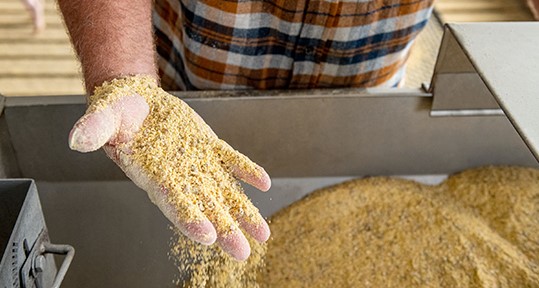
Agricultural News
New Research Defines ASFV Stability in Feed Held at Three Storage Temperatures
Tue, 01 Nov 2022 13:05:20 CDT
 A new report in the journal Transboundary and Emerging Diseases entitled, “Stability of African swine fever virus in feed during environmental storage,” details the length of time ASFV remains stable in feed at different storage temperatures. The robust study was conducted by a research team led by Dr. Megan Niederwerder, now Associate Director of the Swine Health Information Center.
A new report in the journal Transboundary and Emerging Diseases entitled, “Stability of African swine fever virus in feed during environmental storage,” details the length of time ASFV remains stable in feed at different storage temperatures. The robust study was conducted by a research team led by Dr. Megan Niederwerder, now Associate Director of the Swine Health Information Center.
“Previous estimates of ASFV stability in feed were based on fluctuating temperature and humidity conditions consistent with global trade,” Niederwerder explained. “Novel data generated in the current study defines ASFV stability in feed at constant temperatures. This was an essential next step to guide holding-time recommendations for high-risk feed ingredients within feed mills and swine farms.”
In the published study, the stability of ASFV Georgia 2007 was determined in three feed matrices, including complete feed, soybean meal, and ground corncob particles. After ASFV contamination, feed matrices were held at three environmental temperatures (cool storage at 40°F, ambient storage at 68°F, and hot storage at 95°F) for up to 365 days. Feed samples were tested throughout the one-year period for ASFV genome detection on PCR and ASFV infectivity on cell culture and in swine bioassay.
Results demonstrate high stability of ASFV DNA in feed, with detection by PCR in almost all feed matrices throughout the conclusion of each study, including 365 days after ASFV inoculation when stored at 40°F and 68°F. Infectious ASFV was most stable in soybean meal, with the virus maintaining infectivity as determined by swine bioassay for at least 112 days at 40°F, at least 21 days at 68°F, and at least seven days at 95°F.
Additionally, feed additives were tested for their ability to reduce ASFV infectivity in complete feed stored at three environmental temperatures (40°F, 68°F, 95°F). Both medium chain fatty acid and formaldehyde-based feed additives were confirmed to be effective mitigants in tested conditions.
Results help define the risk and mitigation of ASFV introduction through feed, confirms thermal sensitivity of ASFV in feed, and underscores the stabilizing environment of soybean meal. Providing the most comprehensive data on ASFV longevity in plant-based feed to date, this study confirms ASFV DNA can be detected in feed at least one year after contamination. Further, swine bioassays demonstrate that infectious ASFV can be present in soybean meal for several weeks after testing negative on cell culture.
“Minimum holding time recommendations were generated in this research for three environments, providing producers and feed mills key guidance to reduce ASFV risk in feed,” Niederwerder concludes. “Feed biosecurity should be considered a fundamental part of all swine biosecurity plans. This foundational study furthers our goals toward ASFV prevention and protection of US swine herd health.”
Research was supported by funding from the National Pork Board and the Foundation for Food and Agriculture Research, the State of Kansas National Bio and Agro-defense Facility Fund, Purina Animal Nutrition, Cargill Animal Nutrition, and Kemin Industries.
Credit: Swine Health Information Center
[
WebReadyTM Powered by WireReady® NSI
Top Agricultural News
More Headlines...





